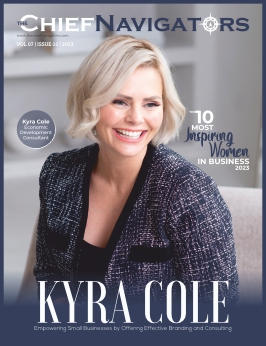Kyra Cole: Empowering Small Businesses by Offering Effective Branding and Consulting
The 10 Most Inspiring Women in Business, 2023

Kyra Cole’s trajectory from branding expert to influential economic development powerhouse is making big waves in the business community. Her fresh perspective is disrupting the tourism sector by challenging the values of the industry at large, and this changemaker has no plans of slowing down.
Kyra’s journey has spanned governmental, private sector and First Nations work, but looking back, the throughline has always been leveraging the power of shared values and effective storytelling. Having secured over $40,000,000 in project funding in the last three years, she has become a critical player in the tourism and economic development space, specifically through the lens of Indigenous tourism in Canada. Her extensive branding knowledge, storytelling skills, and radical business model have made KLB a leading consultancy for values-driven businesses who are looking to scale up.
After the global upheaval of COVID-19, Kyra witnessed the devastating fallout for small businesses in her community. After seeing the Indigenous Tourism Association of Canada’s disheartening statistics highlighting the disproportionate toll on Indigenous businesses, and groundbreaking projects to support Indigenous communities in Southern Ontario being jeopardized for lack of funding, she was driven to action. Kyra began to explore pandemic relief funds made available for community support projects, securing the funding needed to keep these critical infrastructure projects on track.
Empowering Tourism Entrepreneurs
In late 2022 KLB Consulting (KLB) collaborated with Tourism Haldimand and Haldimand County to support four tourism operators in launching their tourism experiences. This five-month project involved activities such as site tours, group training sessions, individual coaching, piloting of experiences, and the development of e-commerce platforms, digital marketing materials, marketing strategies, and an advertising campaign. KLB’s omprehensive support enabled all four operators to successfully bring their experiences to market in 2023.
According to Kyra, the success of individual businesses is measured not only by the revenue generated from their experiences but also by the sense of purpose and connection to their roots that inspired them to develop these experiences in the first place. On a community level, success is gauged by the collective impact of like-minded businesses, attracting high-value visitors who contribute to the local economy and leave a positive and lasting impression on the community. This reciprocal relationship between hosts and guests creates a mutually beneficial dynamic, where both parties benefit and the community is enriched as a result.
Value-Driven Approach to Community Development
Fueled by the profoundly positive impact of her efforts, KLB established itself as a values-driven business focused on regenerative economic development and tourism. This means that the company consciously chooses to work only with organizations and businesses that primarily serve their communities, such as non-profits or social enterprises, or those that leave a positive impact on the audience they serve. By aligning with the United Nations’ Sustainable Development Goals in meaningful ways, KLB recognizes that these clients are actively contributing to the betterment of communities.
While any well-seasoned branding expert would agree, restricting your potential client base to those with shared community-driven values is a radical, uncharted business decision, Kyra’s out-of-the-box business model has proven to be sustainable with a 500% client growth over 2 years. Business and core values have not always been fond bedfellows, the KLB team’s passion for community has happily married the two.
Kyra adopts a broad definition of “community” since it can vary depending on individual perspectives, acknowledging that borders are a construct of colonialism. Growing up in a military family and having lived in various parts of the world, Kyra’s understanding of community is not solely based on geography, religion, or ancestry. Instead, community represents a group of individuals sharing similar values and goals, working collaboratively toward a common objective. These are people who strive for a more inclusive and equitable world and collaborate to bring about positive change.
Challenging Systemic Frameworks for Community Well-being
The primary challenges currently faced by KLB are deeply ingrained within the systemic framework of economic development. Kyra points out that capitalism, which serves as the foundation for economic development, carries inherent traits of patriarchy, colonialism, and extraction. The prevailing economic models prioritize the pursuit of profit and financial transactions, often referred to as “chasing smoke stacks” or “making cash registers ring.” However, research demonstrates that vibrant and thriving communities are actually built on the principles of community economic development. This approach involves communities identifying and implementing their own solutions to address economic, social, and environmental issues, ultimately fostering healthy and sustainable communities.
Community Economic Development, although a relatively new term to many, is rooted in Indigenous knowledge that has existed since time immemorial. As a non-Indigenous woman working in this field, Kyra recognizes the importance of embracing a perspective that honors the profound impact of traditional Indigenous knowledge and concepts of community and collective development.
Rethinking Economic Development for Community Collaboration and Self-Determination
The Indigenomics Institute, for example, is leading remarkable efforts in promoting an alternative approach to economic development that prioritizes community collaboration, Indigenous self-determination, and economic self-sufficiency. This approach seeks to benefit both communities and businesses by aligning their interests. Kyra believes it is crucial to reassess how we gauge economic success, going beyond simplistic measures like job numbers or customer counts. Instead, we should delve deeper and incorporate indicators such as cultural revitalization, capacity building, land stewardship, and social action into our evaluation of success. This broader perspective opens up new possibilities for a more inclusive and holistic understanding of economic progress.
Kyra draws inspiration from the influential work of Carol Ann Hilton, particularly her book “Indigenomics,” which sheds light on these important principles. Additionally, Kyra finds motivation in the endeavors of Jaymie Campbell and White Otter Design Co, her colleague in the field, who contribute to the exploration and advancement of these transformative ideas.
Crafting a Cohesive Brand
Kyra believes that a strong brand strategy begins by understanding the “why” and “how” of an organization. This involves aligning the organization’s core values with its strategic plans in a thoughtful manner. Once this foundation is established, the KLB team focuses on developing or reviewing the brand voice and aesthetic to ensure a cohesive representation of the organization’s identity and messaging.
During the process of creating comprehensive brand strategies and guides for clients, KLB relies on up-to-date data obtained from relevant industry organizations. By incorporating international best practices and industry trends, the team ensures that the strategies are informed and effective. The use of data-driven approaches is crucial, not only for achieving success but also for guiding decision-making processes and facilitating effective communication with internal and external stakeholders, funders, and the wider public.
Defining Success
Kyra acknowledges that every client has unique measures of success, and KLB works closely with each client to define their specific metrics. These metrics can be both quantifiable, such as job creation, revenue growth, or increased reach, as well as qualitative, including factors like collective action, grassroots involvement, reduced reliance on government funding, cultural revitalization, community engagement, and overall community vibrancy. While defining these metrics may present challenges, especially in the short term, Kyra believes that over time, they will become widely embraced as indicators of success.
When considering long-term impact, the metrics may extend to indicators such as the establishment of new businesses within a community, visitors who align with community values, improvements in health and wellness statistics, climate resilience, emissions reductions, and the achievement of economic self-sufficiency. This includes reducing reliance on government support and supporting new community programming through diversified revenue streams. The specific performance indicators and timelines for tracking success are developed collaboratively with each client, ensuring a tailored approach that can be evaluated at various intervals in the future.
Revitalizing Economic Development through Regenerative Practices
As devastating as it was, the COVID-19 pandemic was a catalyst for change in the Economic Development landscape. It made the world understand the importance of community, local support, how destructive some industries can be and have been to the environment, and how collective action and momentum makes changes.
According to Kyra, regenerative economic development is the current and future opportunity that should be embraced. This approach emphasizes practices that aim to restore and build, rather than exploit and destroy, marking a shift away from the traditional “profit at all costs” model. The global landscape is witnessing Indigenous-led organizations leading the path towards economic prosperity, particularly among historically marginalized communities, as evident in places like Hawaii and Canada.
Organizations are embracing strategies such as limiting visitor numbers, creating high-value and high-yield tourism experiences, and prioritizing emissions reduction and climate impact. By focusing on these aspects, they are demonstrating a commitment to sustainability, environmental stewardship, and the well-being of their communities. This emerging trend showcases the potential for economic development that not only generates prosperity but also ensures the long-term vitality of both the local environment and the people it supports. “We have an opportunity to dramatically shift how we do business, align with sustainable development goals on a global level to sustain and preserve our world for future generations,” says Kyra.
Creating an Empowered Path
Kyra’s advice to aspiring economic development professionals is to resist conformity and carve their own path. They should question existing processes, challenge biases, and not be afraid to find or create new opportunities. Kyra emphasizes the importance of community over competition, particularly for women in male-dominated fields. Building supportive relationships and embracing an intersectional mindset is key to success. By finding like-minded individuals and fostering strong connections, professionals can create a safe space for sharing ideas and supporting each other’s growth.
Website: www.klbconsultants.ca



